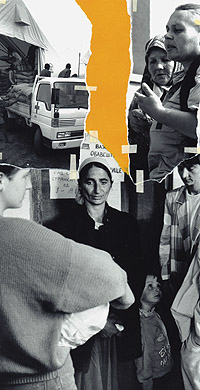The
Sadly, religious loyalties, instead of serving as a resource for peaceful resolution of such conflicts, are often used as rallying points to inflame them. When the religious convictions of one or more parties to a conflict are identified as Christian, the situation becomes particularly painful for the churches.
That was the case in two of the great tragedies of the 1990s: the civil war in the former Yugoslavia, and the genocide in Rwanda, the African country with the highest percentage of Christians.
Conflicts like these present a challenge to the World Council of Churches, with its worldwide membership and its deep commitment to the promotion of one human family in justice and peace. How can the WCC aid the churches in undertaking a ministry of reconciliation?
The call to and costs of such a ministry were emphasized by the Canberra assembly in 1991:
ministry
of
reconciliation
All too often, mutual mistrust and suspicion -- growing out of poisoned historical memories, economic injustice and uncertainty, ignorance and stereotypes of the other -- take violent expression. Massive human suffering results, sowing the seeds for more generations of hatred and alienation.
God and humankind are reconciled by the costly sacrifice we see in the cross of Christ. Our appropriation of reconciliation and our acceptance of the ministry of reconciliation are also costly. Through our acceptance of the ministry of reconciliation, we become a missionary people, sharing God's own mission of bringing all humanity into communion with God through Christ in the power of the Spirit, sharing our faith and our resources with all people.

Moving clockwise from the top left, the images are 1: Tanzania, 1994: Food distribution at Benaco refugeecamp (Don Edkins/WCC); 2: Former Yugoslavia, 1995: Zenica refugee camp (Hugh McCullum/WCC); 3: Former Yugolsavia, 1992: Food and medicines are distributed to refugees from Bosnia-Herzegovina (A. Hollmann/UNHCR).